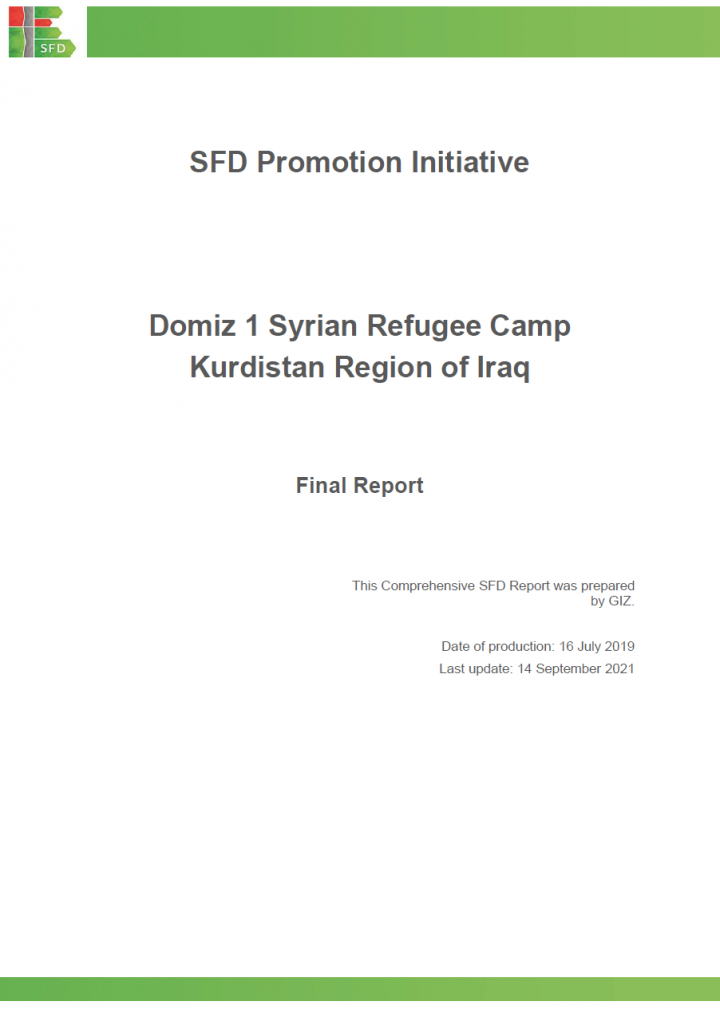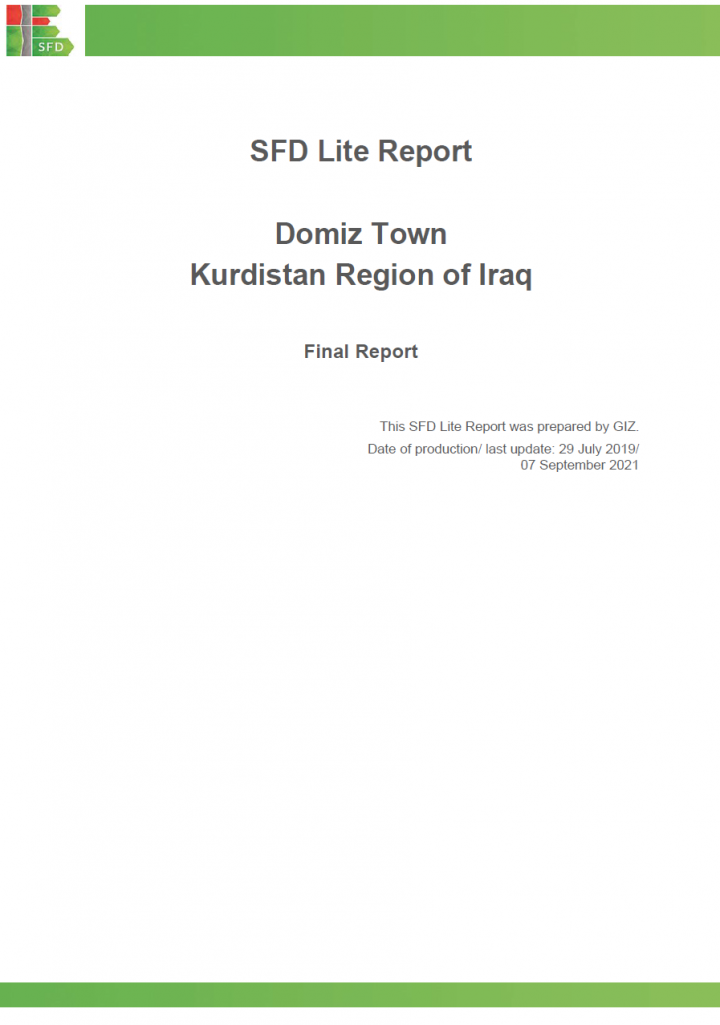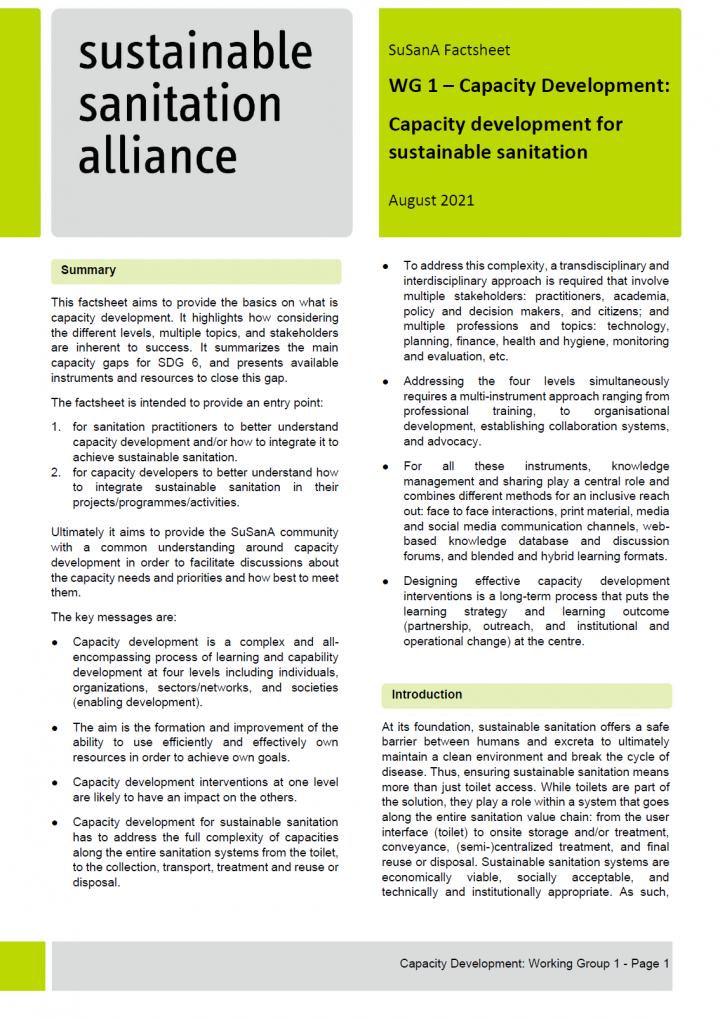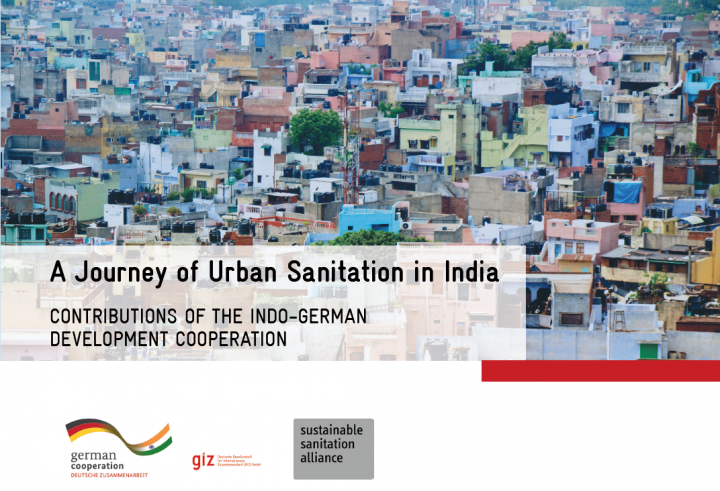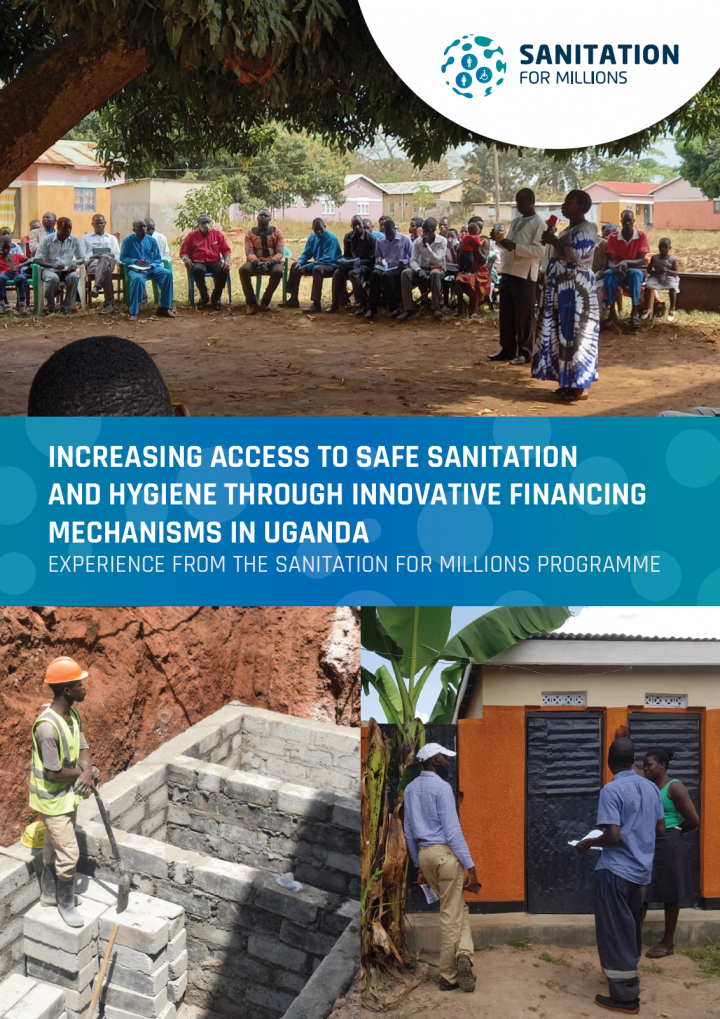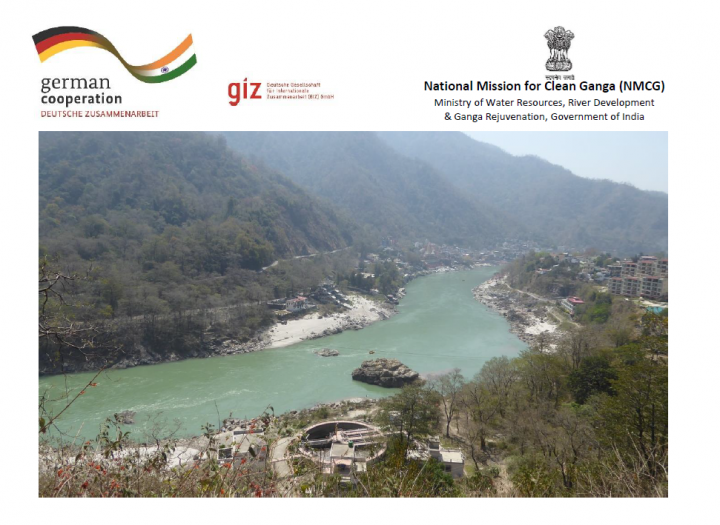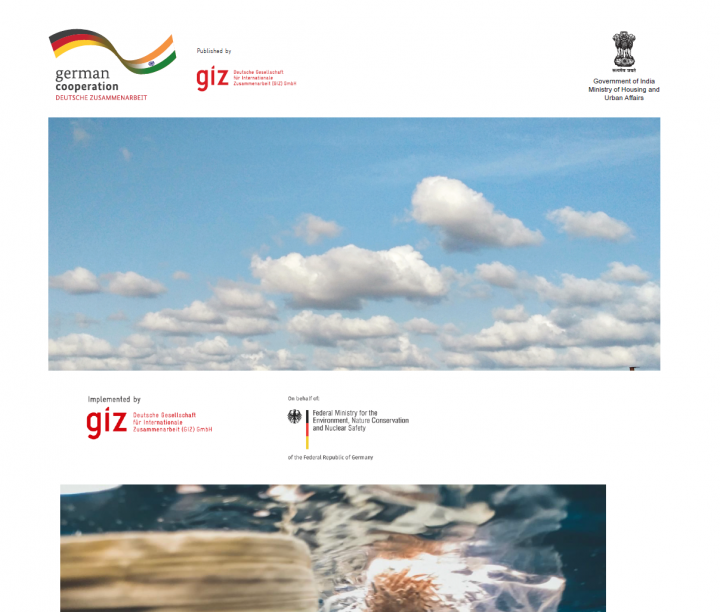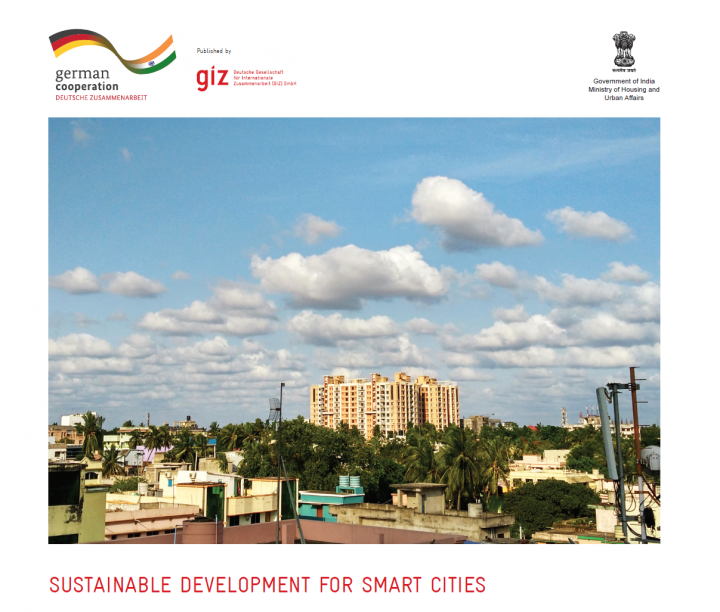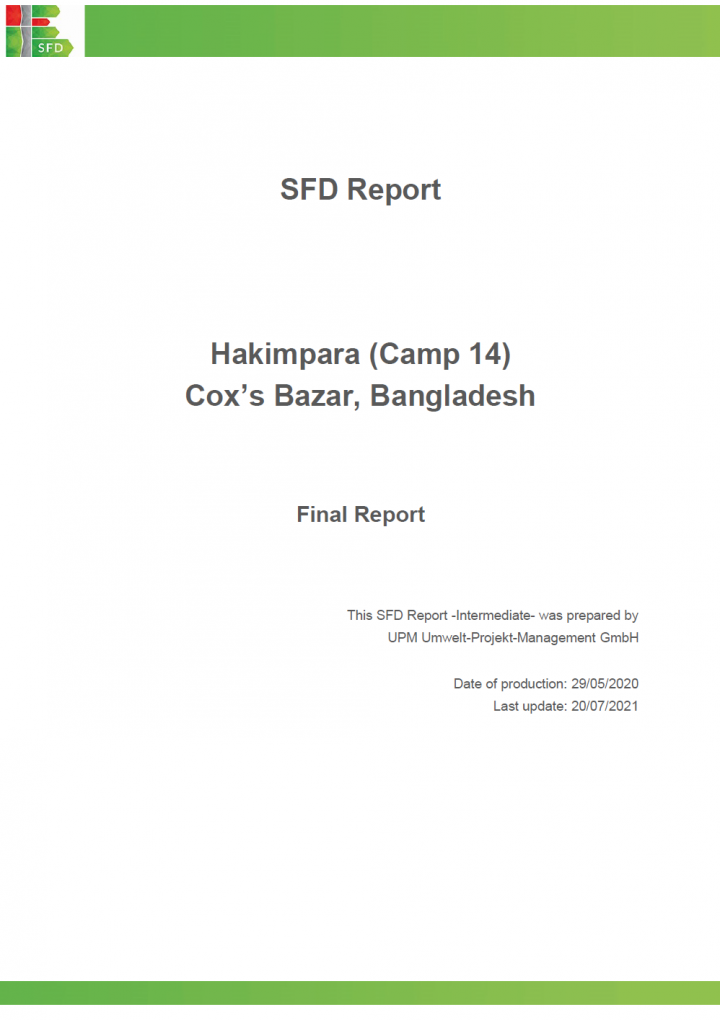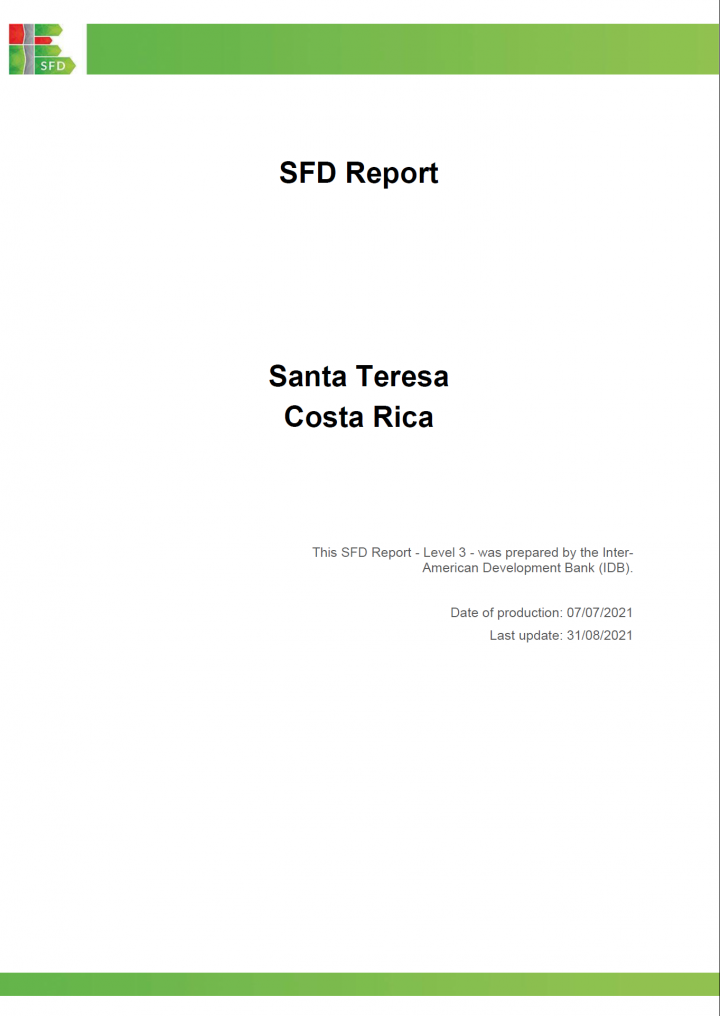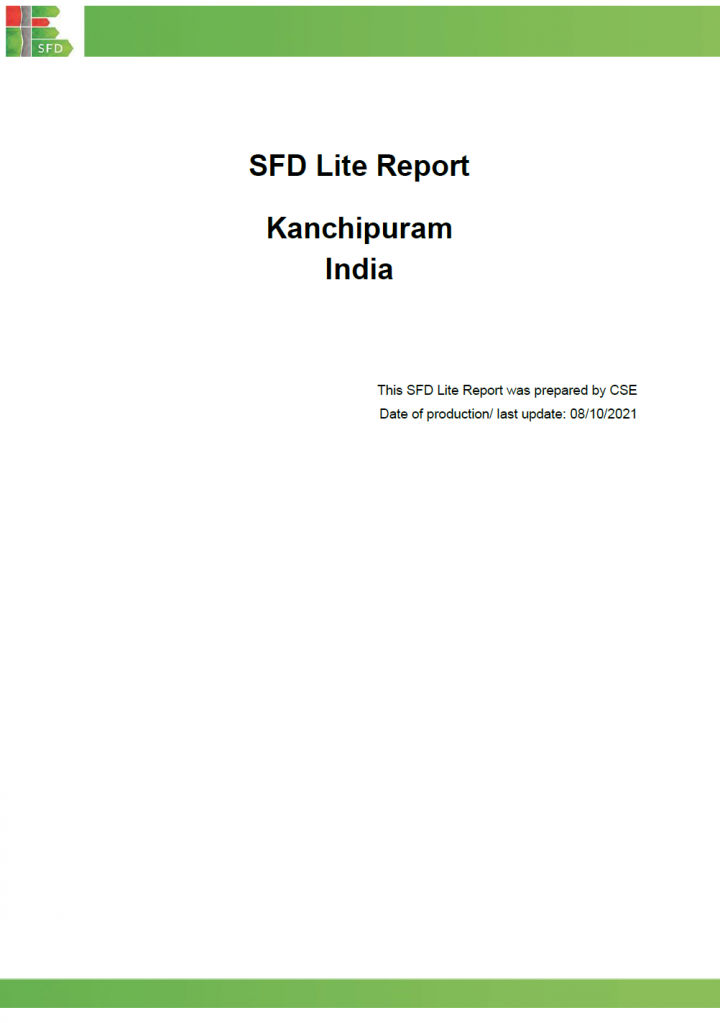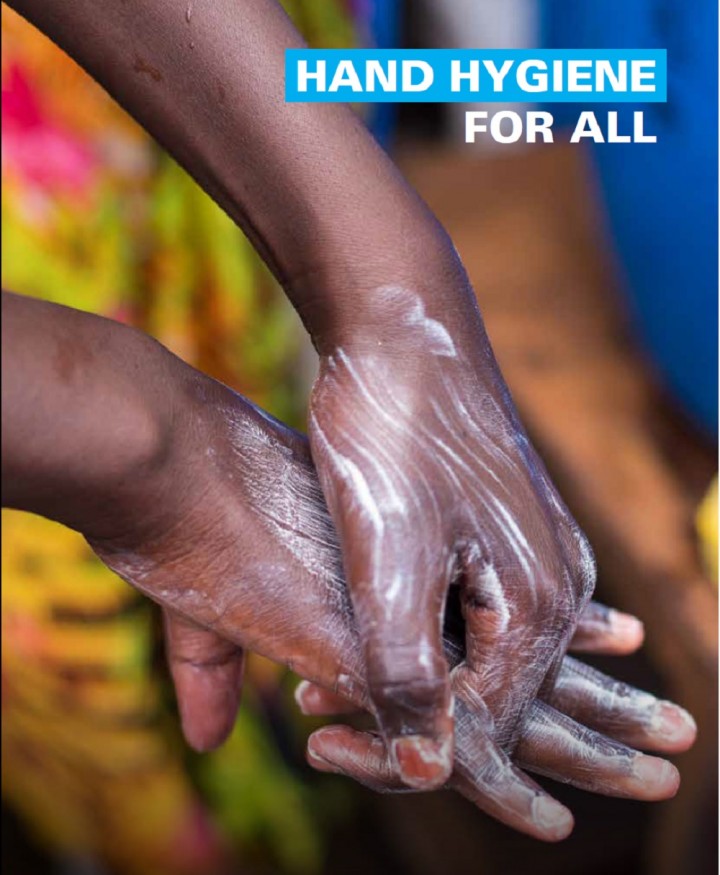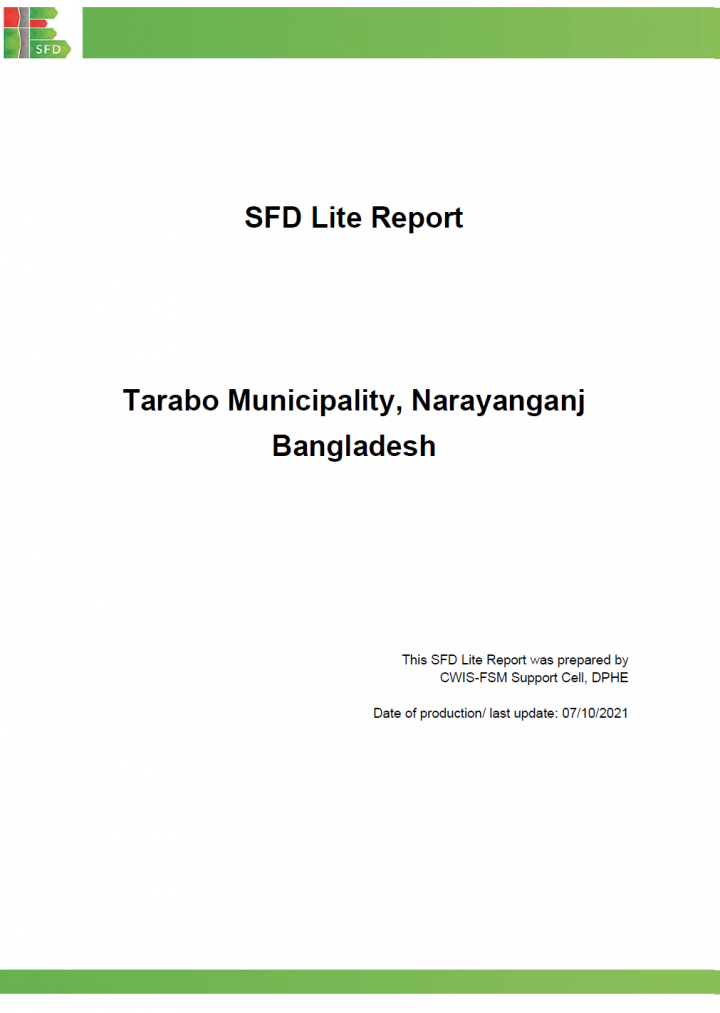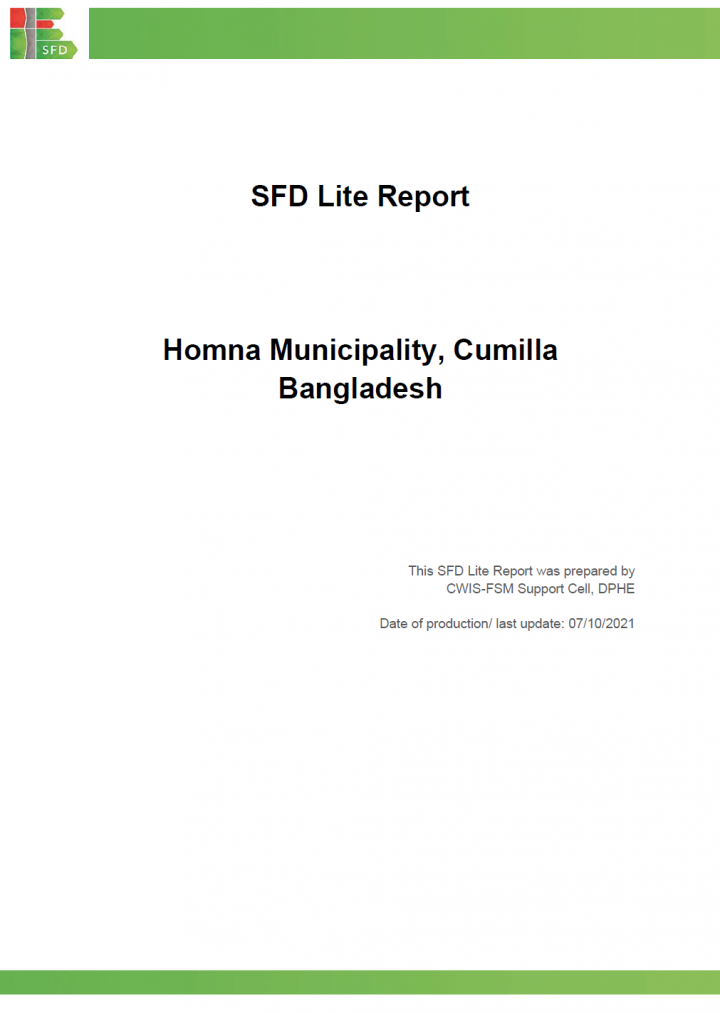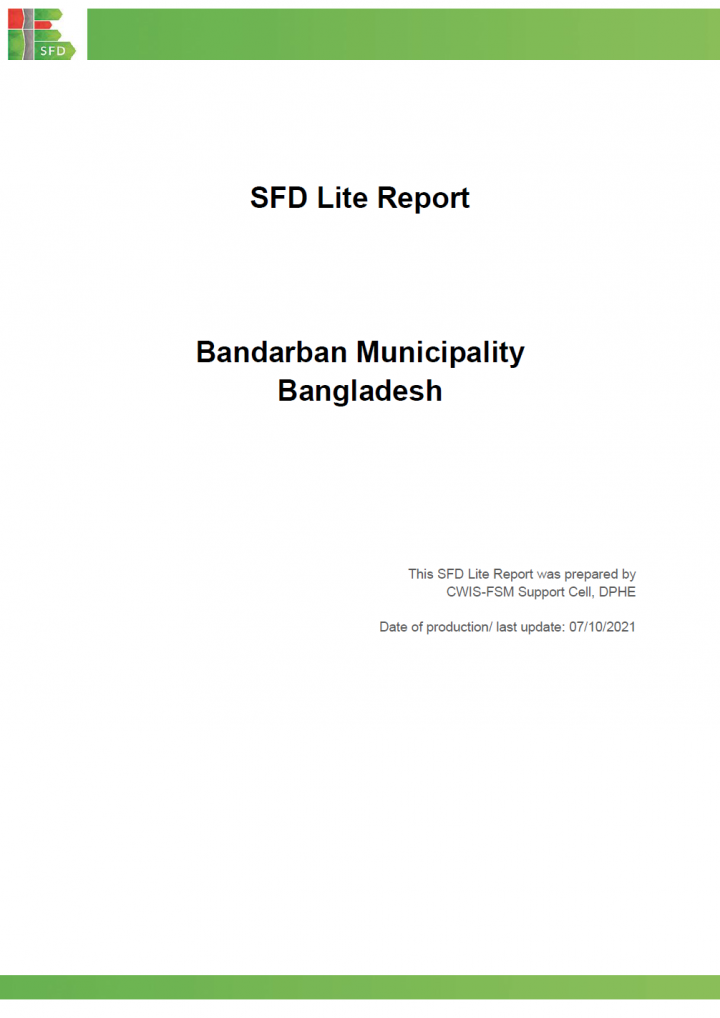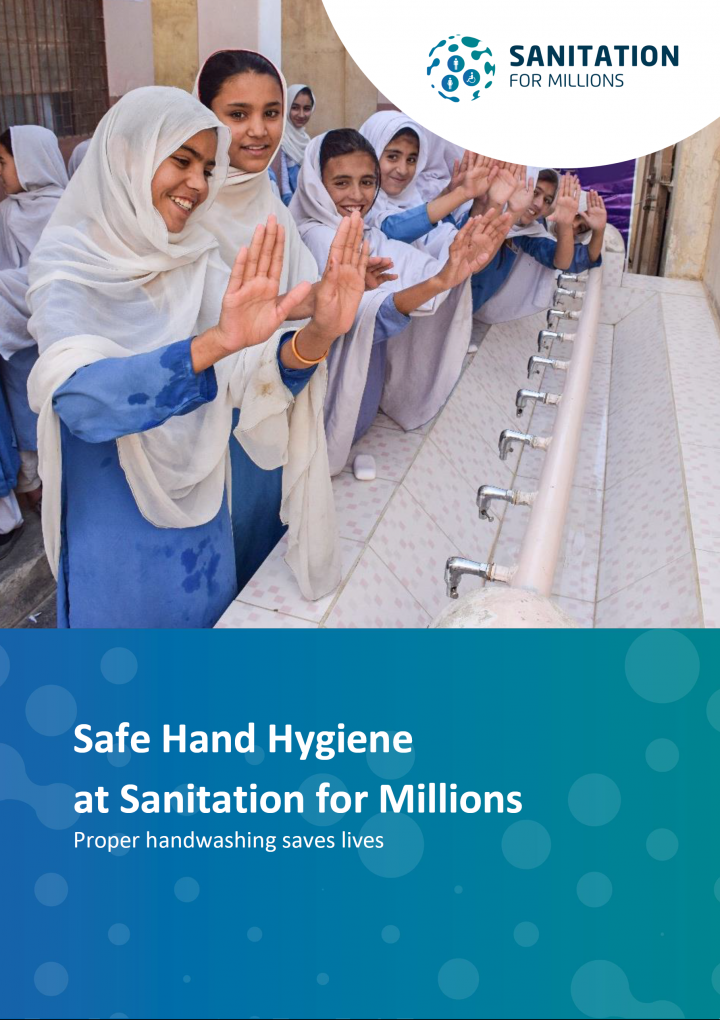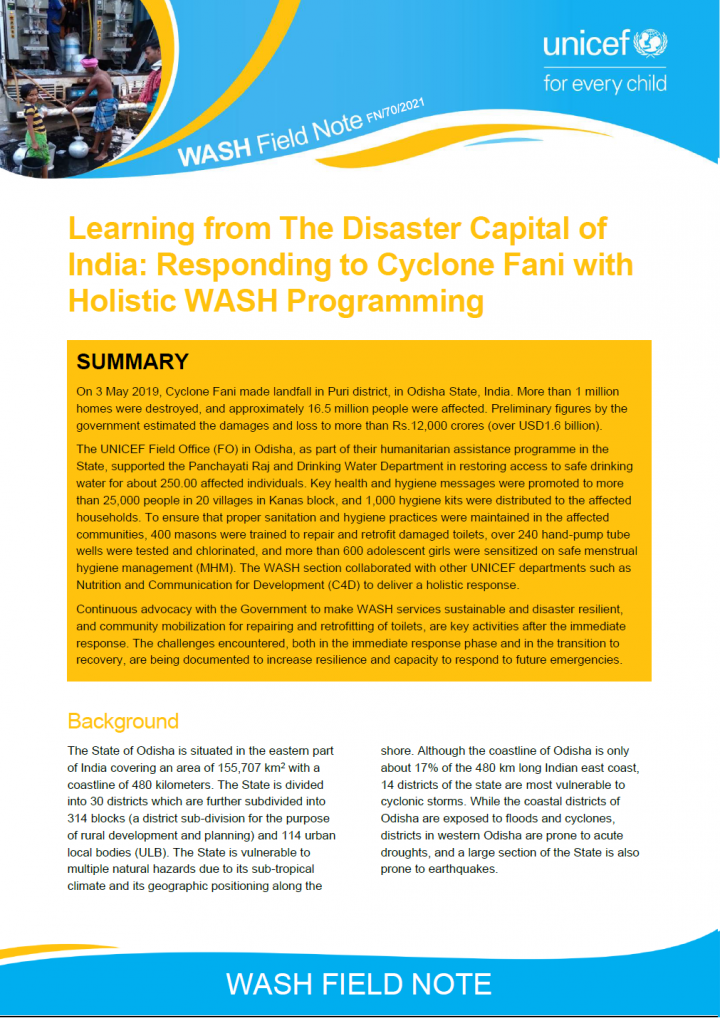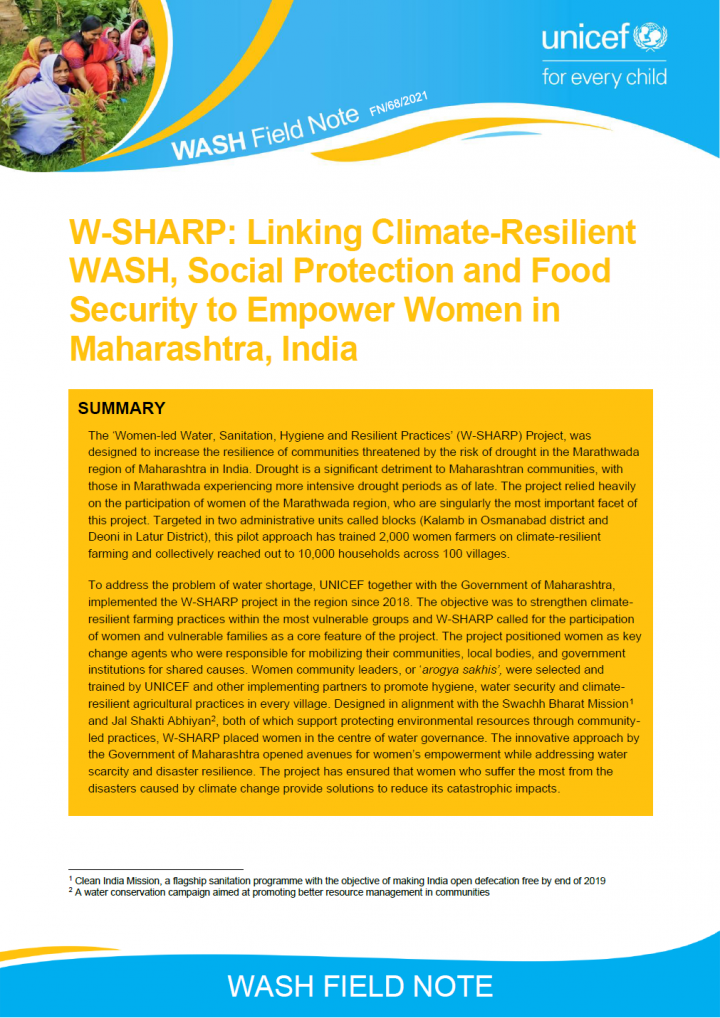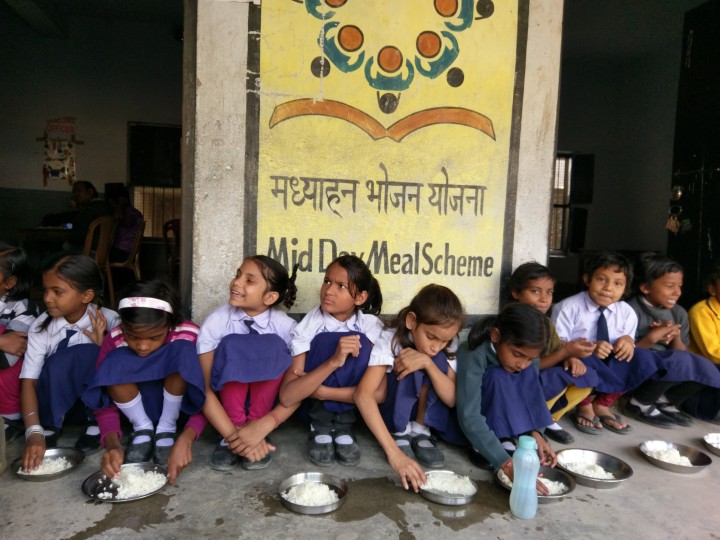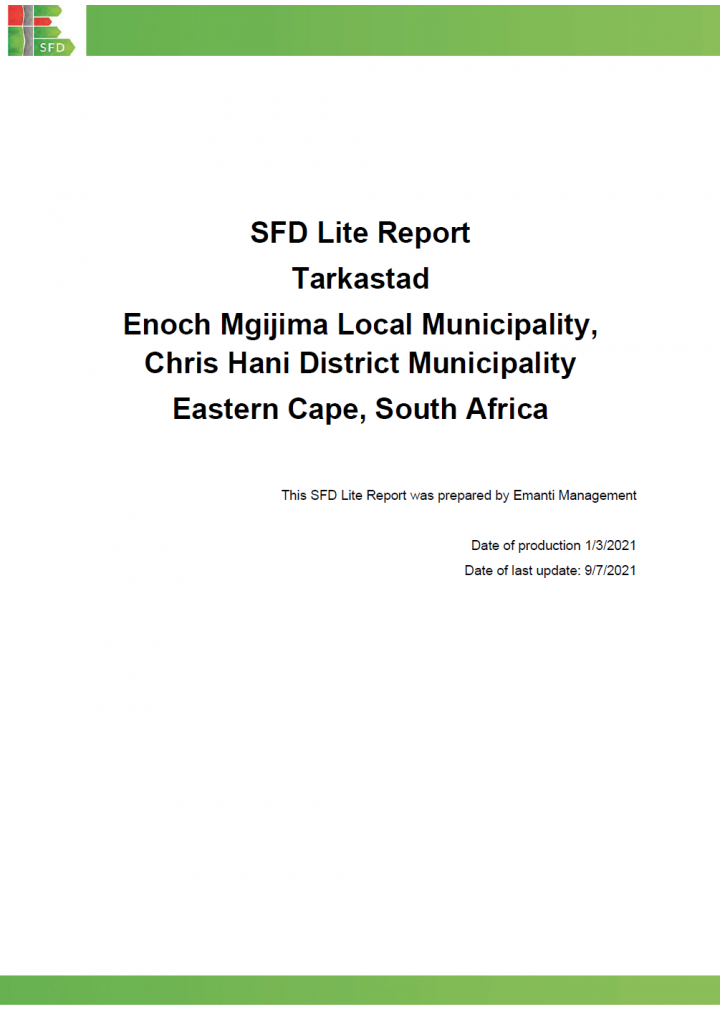GIZ (2021) SFD Promotion Initiative Domiz 1 Syrian Refugee Camp Kurdistan Region of Iraq
Domiz 1 Syrian refugee camp is located on the outskirts of the Domiz Township, near the city of the Duhok, in the Kurdistan Region of Iraq. The camp was intended to be temporary in nature to provide shelter to those fleeing the war in Syria. Having been established in 2012 and currently being expanded and upgraded in July 2019, it is now reasonable to expect […]
GIZ (2021) SFD Lite Report Domiz Town Kurdistan Region of Iraq
This SFD Lite relates to the older part of Domiz Town, rather than the newer developments, for which it is difficult to obtain any information for. Domiz town is located, near the city of the Duhok, in the Kurdistan Region of Iraq. It is approximately 16km to the south of Duhok, along the highway to Mosul, which is 65km further south. Based on an interview […]
Spuhler, D., Kohler, L., Kapur, D., Volk, F., Staack, F., Ddieba, D., Sutter, F., van Soelen, S. (2021) Capacity development for sustainable sanitation Factsheet of Working Group 1
This factsheet aims to provide the basics on what is capacity development. It highlights how considering the different levels, multiple topics, and stakeholders are inherent to success. It summarizes the main capacity gaps for SDG 6, and presents available instruments and resources to close this gap. The factsheet is intended to provide an entry point: 1. for sanitation practitioners to better understand capacity development and/or how to […]
Sinha, S., Kapur, D., Panesar, A., Sharma, R., Venugopal, V., Bahl, M., Büürma, M., Tempel, A., Köcke, S. (2022) A Journey of Urban Sanitation in India Contributions of the Indo-German Development Cooperation
The sanitation situation in India has improved significantly in the last few years. This has been made possible by the foundation laid by various efforts - policies, programmes, investments and collaborations - over the years. This publication aims at describing India’s urban sanitation journey and the contribution to it by the Indo-German Development Cooperation specially over the last ten years.
Sanitation for Millions (2021) Increasing access to safe sanitation and hygiene through innovative financing mechanisms in Uganda Experience from the Sanitation for Millions programme
Globally, 4.2 billion people do not have access to safe sanitation services, and approximately 3 billion lack basic handwashing facilities. Even in 2021, almost 700 million people still practise open defecation and nearly 400 million children attend schools with no sanitation facilities at all. The large financing gap has been identified as one of the greatest barriers to achieving the water, sanitation and hygiene-related targets of […]
GIZ (2021) Support to Ganga Rejuvenation Factsheet
The river Ganga is of enormous historical, economic, physical and metaphysical importance to India and is lifeline to millions of Indians living on its banks. It is considered a goddess in Hindu mythology and also has been prime witness of other religions. Originating in the western Himalayas, Ganga flows south and east through five states in India. The […]
GIZ (2021) Cities Combatting Plastic Entering Marine Environment
Current estimates based on a limited number of modelling studies suggest that globally some 9-10 million tonnes of plastics enter the oceans annually to become marine litter. Moreover, it is estimated that 15-20% of all plastics are entering oceans via riverine ecosystems of which 90% are contributed by 10 of the world’s most polluting rivers only. Two of these rivers are located in India, namely […]
GIZ (2021) Sustainable Development for Smart Cities
Rapidly urbanising India is estimated to reach an urban population of 600 million from what was around 377 million in the year 2011. Th is implies that almost 40 per cent of India’s population would be living in urban areas by 2030. Th is rapid increase would add to the complex challenges that the Indian cities are facing such […]
UPM Umwelt-Projekt- Management GmbH (UPM) (2021) Hakimpara (Camp 14) Cox’s Bazar, Bangladesh SFD Intermediate Report
This SFD report looks at Hakimpara, Camp 14, a sub-division of a larger Rohingya refugee camp site in Palong Khali union, Teknaf upazila, Cox’s Bazar District (CXB District) in Bangladesh. As for end February 2021, there were 32,815 people registered in Camp 14 and over 870,000 people (Inter Sector Coordination Group - ISCG 2021 & UNHCR 23.03.2021) registered in total in the 34 sub-camps and […]
IDB (2021) SFD Report Santa Teresa, Costa Rica
The town of Santa Teresa is located in the extreme southwest of the Nicoya peninsula, in the canton and province of Puntarenas, in the North Pacific Region of Costa Rica. Santa Teresa administratively belongs to the Cóbano district. Santa Teresa is formally only one of the towns of the district. However, Santa Teresa traditionally comprises the set of towns that extend linearly along the 15 […]
CSE (2021) SFD Lite Report Kanchipuram India
Kanchipuram Municipality is comprised of 51 wards with a total population of 2,32,816. The total area is 36.14 Square kilometers. The city is on the northeast side of Tamilnadu and is located 76 km away from the state capital Chennai (see Figure 2). It’s a Municipality administration city. The city is located in the banks of the river Vegavathi. Kanchipuram is considered one of the […]
UNICEF (2021) Snapshots on Hand Hygiene in South Asia
Three billion people – 40 per cent of the world’s population – do not have a place in their homes to wash their hands with water and soap. Three quarters of those who lack access to water and soap live in the world’s poorest countries and are amongst the most vulnerable: children and families living in informal settlements, migrant and refugee camps, or in areas […]
CWIS-FSM Support Cell, DPHE (2021) SFD Lite Report Tarabo Municipality, Narayanganj Bangladesh
The Tarabo Municipality is 14 km away from Dhaka, the capital of Bangladesh. This sub-district town is recognized as the “Intangible Cultural Heritage of Humanity” by UNESCO. Tarabo Municipality is adjacent to the Shitalakkha river and the Dhaka-Sylhet highway has passed through the town. Within the last few decades, the sub-district town has been turned into an industrial zone of more than 300 medium to […]
CWIS-FSM Support Cell, DPHE (2021) SFD Lite Report Homna Municipality, Cumilla Bangladesh
Homna is a sub-district town of Comilla district in the division of Chittagong, Bangladesh. The town is situated beside the Titas River and well connected with road and water to the capital city Dhaka. It town was declared as Municipality in 2002. According to the population census of 2011 by the Bangladesh Bureau of Statistics (BBS), the Municipality population was 29,173. The urban population growth […]
CWIS-FSM Support Cell, DPHE (2021) SFD Lite Report Bandarban Municipality Bangladesh
Bandarban is located in the South-East of Bangladesh. Bandarban is a hilly District and Bandarban municipality is the district town. It is a fast-growing city, which is 324 km away from Dhaka city. It is beside the Sangu River and well connected with road and water. It is one of the oldest towns in the sub-continent and was declared Municipality in 1984. Bandarban is one […]
GIZ Sanitation For Millions (2021) Sanitation for Millions' approach to Safe Hand Hygiene
Sanitation for Millions has assessed its interventions in the three partner countries Jordan, Uganda and Pakistan in the context of the COVID-19 pandemic and identified various WASH-related measures which represent an adequate and effective response to COVID 19 in particular and to pandemics and infection control in general. Handwashing is one of the core activities carried out regarding safe hygiene. According to international research results, infections […]
UNICEF (2021) Learning from The Disaster Capital of India: Responding to Cyclone Fani with Holistic WASH Programming
On 3 May 2019, Cyclone Fani made landfall in Puri district, in Odisha State, India. More than 1 million homes were destroyed, and approximately 16.5 million people were affected. Preliminary figures by the government estimated the damages and loss to more than Rs.12,000 crores (over USD1.6 billion). The UNICEF Field Office (FO) in Odisha, as part of their humanitarian assistance programme in the State, supported […]
UNICEF (2021) W-SHARP: Linking Climate-Resilient WASH, Social Protection and Food Security to Empower Women in Maharashtra, India
The ‘Women-led Water, Sanitation, Hygiene and Resilient Practices’ (W-SHARP) Project, was designed to increase the resilience of communities threatened by the risk of drought in the Marathwada region of Maharashtra in India. Drought is a significant detriment to Maharashtran communities, with those in Marathwada experiencing more intensive drought periods as of late. The project relied heavily on the participation of women of the Marathwada region, […]
Jacob, N. (2021) Thematic Discussion Synthesis Document Convergent Actions for Improved WASH and Nutrition
This discussion attempted to understand linkages between the preventive and curative aspects of health and WASH and tease out what prevented them from working together. It explored ways to converge programmes in these two areas.
Emanti Management (2021) SFD Lite Report - Tarkastad
Tarkastad (GPS coordinates: 32.0048 S, 26.2717 E) is a primary development node and serves as the local administrative centre for Enoch Mgijima LM (Enoch Mgijima Local Municipality, 2017). Tarkastad used to form part of the Tsolwana Municipality which was subsequently absorbed as part of the Enoch Mgijima LM. Tarkastad initially developed as a farming area and later as a church centre and a municipality in […]
